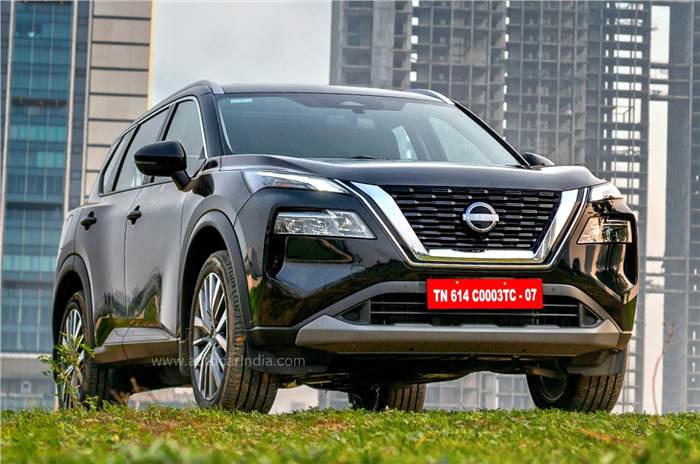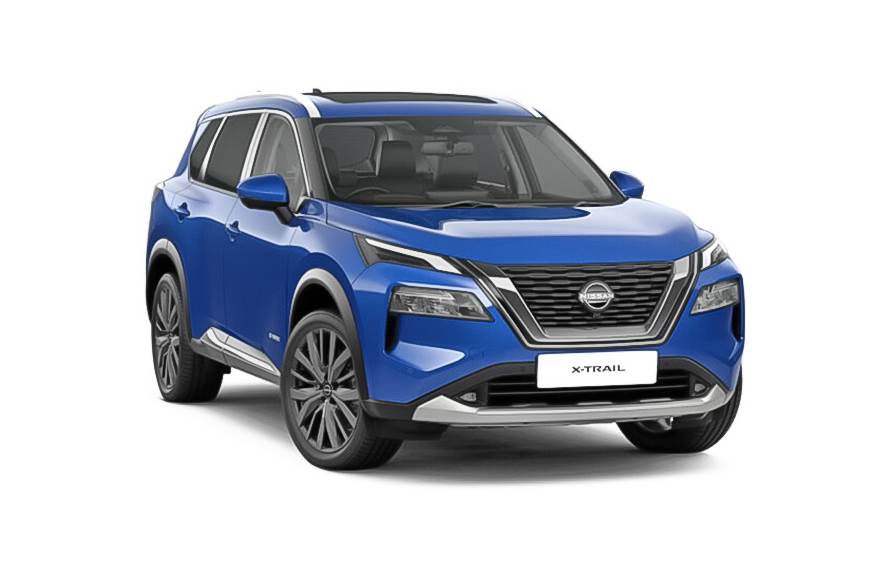For a couple of years now, Nissan India has had just one product – the Magnite compact SUV. And while that is a competent product, it bore the weight of the entire brand on its capable but small shoulders. The Japanese brand has now expanded its portfolio by bringing back the X-Trail to India after a long hiatus. It now comes in as a CBU and is only available in a single variant with a single powertrain. But is it good enough to go toe-to-toe with its rivals and serve as a successful brand-builder for Nissan in India? Read on to know.
Nissan X-Trail: design and dimensions
The X-Trail is immediately identifiable as a Nissan SUV at first glance. Key design elements include Nissan’s V Motion front grille in chrome, angular split headlamps and tail-lamps, and a floating effect for the roof. Nissan's engineers have also made use of several aero elements: air curtains in the bumpers below the headlamps that help channel the air away from the tyres, and the active grille shutters in the lower air dam that open when cooling is required.
Along the sides, there’s a prominent shoulder kink on the front and rear fenders, and the attractive 20-inch alloys – the largest in the class and a USP for the X-Trail – fill the wheel arches well. At the rear, the upright tailgate houses the number plate, and there’s a chunky faux skid plate at the bottom. Overall, the X-Trail is a handsome-looking SUV with its sharp lines and upright stance –a good mix between the boxy looks of the first two generations that were sold in India, and the curvy third-gen model that wasn’t.
As for dimensions, the new Nissan X-Trail measures 4,680mm in length, 1,840mm in width, and 1,725mm in height, which makes it shorter and narrower but taller than the Skoda Kodiaq, its main rival. The SUV has a 2,705mm wheelbase, has a generous 210mm of ground clearance and sits on 255/45 R20 tyres. The Nissan X-Trail is available in three colours – Diamond Black, Champagne Silver and Pearl White.
Nissan X-Trail: interior and features
The X-Trail has a neat and straightforward yet attractive dashboard design, although some might find it a bit subdued for an SUV in this class. There is a good mix of materials used, from leatherette to gloss-black trim, and the quality, fit-finish look and feel good. The touchscreen takes up prime real estate on the dash, but disappointingly, it’s the old, small 8.0-inch unit from the Kicks. You can tell by the wide mounting space on the dash that this is not the largest screen they could have offered.
Speaking of, the X-Trail also features a 12.3-inch digital instrument cluster, a 360-degree camera, wired Apple CarPlay and Android Auto, dual-zone auto climate control, a panoramic sunroof, wireless phone charger, and more. As for the safety kit, you get 7 airbags, auto headlamps/wipers, traction control, hill-start assist, front and rear parking sensors, and even a limited-slip differential.
Nissan says it has specced the X-Trial for India on the basis of customer feedback. Though decently equipped, it misses out on a lot of feel-good and convenience features that it really ought to have, especially given the competition it's up against. Missing features include leather upholstery, power adjust for the front seats, ventilated seats, a larger touchscreen, powered tailgate and ADAS features – all of which are on offer on the top-spec X-Trail overseas. However, sources tell us that the next batch of X-Trails imported will be better equipped.
What’s nice though is that there are plenty of storage spaces around the cabin. The door pockets have good space and so does the centre armrest. Uniquely, there’s also a sizeable cubby below the gear lever, though accessing it is a bit difficult. The glove box, however, is small with a good chunk of the space taken up by the fuse box next to it.
The X-Trail now also comes with three-rows seating for added practicality and the way these seats can be configured open up a lot of possibilities, depending on whether you want to haul passengers or luggage. The front seats are comfy and supportive, and feel high quality despite the fabric upholstery. The second row gets a 40/20/40 split-folding function, and there’s a sliding and recline function, too. Space is plentiful here and it’s wide enough to accommodate three adults. The only gripes are that under-thigh support is less for tall passengers and that there’s no proper armrest – the centre seat back plays that role and also houses the cupholders.
Getting into the third row is a challenge as the second row doesn’t fold and tumble out of the way. You have to contort yourself to get back there and it's harder than it needs to be. The third row seats are virtually unusable for adults as there’s barely any knee and footroom, and your head is right up against the tailgate – which can be unnerving. Smaller adults can fit here, but you’ll have to compromise the space in the first two rows for that. This place, then, is best reserved for kids.
It works better still when they’re folded away, as with the third row down, there’s 585 litres of cargo space. This is a massive 1,424 litres with the second row folded.
Nissan X-Trail: powertrain and driving impressions
Under the hood of the new X-Trail is a 163hp, 300Nm, 1.5-litre, 3-cylinder, turbo-petrol engine. It features fuel saving 12V mild-hybrid tech with engine stop/start, and an innovative variable compression turbo. Power is sent to the front wheels via a shift-by-wire, 8-step CVT automatic gearbox – there’s no 4WD, PHEV or diesel on offer. While these specs and details might sound disappointing on paper, in practice, this high-tech powertrain works surprisingly well.
Start the engine and it settles into a silent idle with barely any vibrations, despite being a 3 cylinder. From the off, power delivery is smooth, it feels strong at the top end, and part-throttle response is good. But what really impressed us was this engine’s smoothness, right across the rev range. The X-Trail also gets three drive modes to choose from – Eco, Normal and Sport – that alter the throttle and gearbox responses noticeably.
The variable compression turbo engine adjusts the vertical position of the pistons to vary the compression ratio between 8:1 and 14:1, depending on the demand from the engine – higher compression means better fuel efficiency and lower compression means better performance. There's even a screen in the instrument cluster, detailing how the system is working. On our short drive, the system seemed to work well as it never left us wanting for power, while still delivering appreciable fuel economy.
A special mention also goes to the CVT gearbox, which is among the best of its kind we've experienced. Nissan claims that this new gearbox not only offers CVT reliability but also gives DCT-like upshifts under acceleration. And while that’s a bit of an exaggeration, the gearbox is quick to respond and does a really good job of simulating the gears. When you want it, this CVT can be responsive or smooth, depending on the drive mode and how you drive. You can also take manual control via the paddle shifters.
Nissan claims the X-Trail will do 13.6kpl. While we didn’t get to test the claim, we saw a figure of 12.5kpl on the display during our drive. For reference, the engine spins at under 1,500rpm at 80kph, which helps with efficiency.
Nissan X-Trail: ride and handling
Sitting on those stylish 20-inch alloys, you’d expect the X-Trail’s ride to be on the firmer side. But, surprisingly, it’s actually one of the highlights of this SUV. Bump absorption is impressive and it’s only the sharpest of bumps that filter through. The ride can feel lumpy at low speeds, but it improves as the speeds rise. At highway speeds, the X-Trail feels mature and composed, even though there's a hint of bounciness. Tyre noise is also well contained on this SUV.
The X-Trail’s handling can be best described as predictable. Sure, there’s a fair bit of body roll as expected, but it holds its line through a corner well and there’s good grip on offer from the 255-section Michelin Primacy tyres. And the steering, though a bit light and devoid of feel, gives you a good idea of what the front wheels are doing. The brakes, which are discs all around, have good stopping power.
Nissan X-Trail: price and verdict
Though not targeting huge volumes with this SUV, it’s crucial that Nissan gets the pricing right for the X-Trail. The brand has already imported 150 units of the X-Trail, and we understand that it will be priced above Rs 45 lakh, which would put it above the likes of the Skoda Kodiaq and Jeep Meridian, but more or less on par with the more established Toyota Fortuner.
The X-Trail is an SUV that has more to it than meets the eye and more than its spec sheet would suggest. Quality is superb but subdued, it rides incredibly well, handles with confidence, and though it doesn’t have big headline numbers, the 1.5 mild-hybrid petrol engine is impressively capable. What is a downer is the lack of features for this segment, which will no doubt deter some potential buyers. What it is, however, is a much-needed brand-builder for Nissan, to remind Indian buyers of what the Japanese carmaker can offer, and to prepare them for the new midsize SUVs coming next year.
Also see:
Nissan X Trail video review
Nissan GT-R production to end in October 2024 after 17 years
Deep Drive Podcast: future of Renault, Nissan in India and more
Upcoming
- Videos


